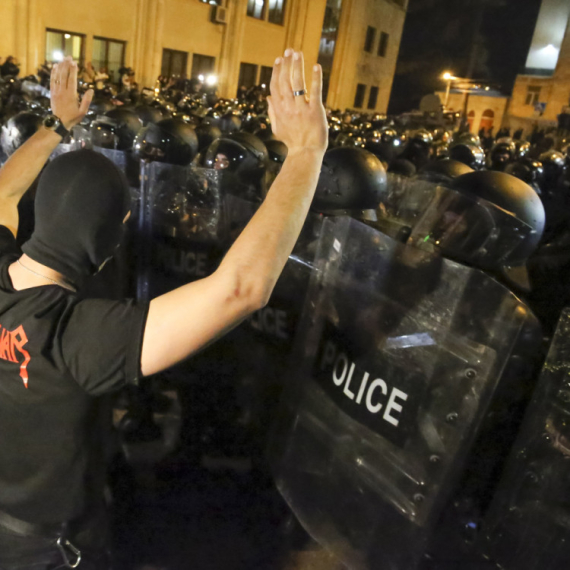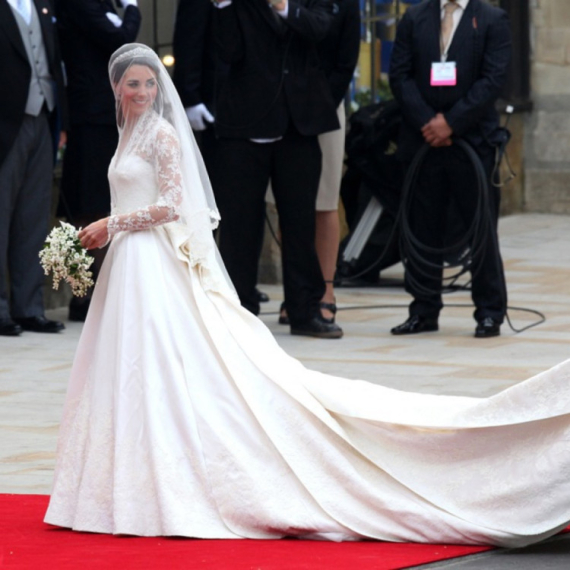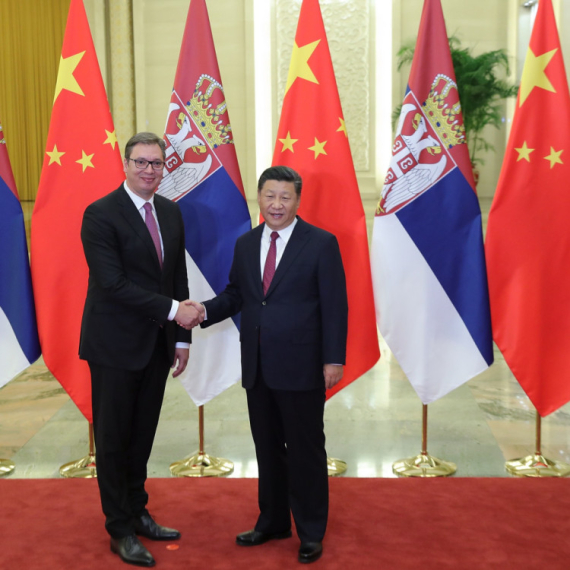PUPS threatens to pull govt. support over pensions
Deputy Prime Minister Jovan Krkobabić does not agree with the IMF’s proposal to postpone the 10 percent pension increase scheduled for next year.
Tuesday, 11.11.2008.
11:20

Deputy Prime Minister Jovan Krkobabic does not agree with the IMF’s proposal to postpone the 10 percent pension increase scheduled for next year. Krkobabic’s Associated Pensioners’ Party (PUPS) will be forced to leave the government if pensioners’ demands are not met, said PUPS official Djuro Peric. PUPS threatens to pull govt. support over pensions According to unofficial reports, the rest of the ruling coalition is not ready to accept the International Monetary Fund’s (IMF) alternative solution—freezing public sector salaries. A temporary solution will be sought during the extended negotiations, which will run until Thursday. B92 has unofficially learned that the IMF has told the government it can either approve the 10 percent increase for pensions next year, or bring it in line with the rise in the cost of living. PUPS officials, however, are adamant that the pension increases will go through, even if it means leaving the government. Peric said that the party was prepared to acknowledge the worries concerning the international financial crisis on Serbia, but that it would not drop its plans to increase pensions. “If our demands are not fully met, if all the facts are ignored and pensions are returned to their former level, we would have to consider suspending our support for the government,” Peric said. He said that the IMF demands regarding pensions were unacceptable to PUPS and that the parameters they were using were incorrect. Democratic Party Whip Nada Kolundzija said that it was not in PUPS’ interest to bring the government down, or for Serbia to enter spiraling inflation, which would render any pension increase pointless. Democratic Party of Serbia (DSS) leader Vojislav Kostunica said that Prime Minister Mirko Cvetkovic had stated earlier that pensions would be increased by ten percent this year, and that they would reach the level of 70 percent of the average wage by next year. “Now it can be seen that parliament’s decision to approve this program means nothing, because the prime minister did not receive the IMF's permission,” Kostunica said. Monetary expert Nikola Fabris believes that the arrangement with the IMF has a predominantly political dimension. “This arrangement could ease the current situation within the ruling coalition that is, by and large, built on unrealistic pledges and unrealistic expectations in terms of salary and pension rises,“ says Fabris. “The IMF’s argument that this is unsustainable could make the ruling coalition’s position easier,“ he says. When it comes to a new arrangement with the IMF, the government has two options—financial or advisory. Fabris says that if the government chooses the latter it will have to respect the recommendations of the institution’s experts on freezing public sector salaries or pensions. Otherwise, if the government enters an agreement but does not take recommendations on board, Serbia could suffer negative consequences. “The consequences of a negative IMF report would be reflected in the country’s credit rating, its international image, and on direct inward investment,“ warns the expert. “The consequences depend primarily on, let’s say, the degree to which the government fails to honor the agreement with the IMF.“ “Every government that signs an agreement with the IMF and enters some king of arrangement should either respect that agreement or not enter an agreement with the IMF at all,“ he explains. Respecting the IMF’s recommendations would, among other things, boost inward investment by showing to foreign companies that Serbia was safe for investment. A positive IMF report would also facilitate cheaper loans. Pensioners await the government's decision (Beta, archive)
PUPS threatens to pull govt. support over pensions
According to unofficial reports, the rest of the ruling coalition is not ready to accept the International Monetary Fund’s (IMF) alternative solution—freezing public sector salaries.A temporary solution will be sought during the extended negotiations, which will run until Thursday.
B92 has unofficially learned that the IMF has told the government it can either approve the 10 percent increase for pensions next year, or bring it in line with the rise in the cost of living.
PUPS officials, however, are adamant that the pension increases will go through, even if it means leaving the government.
Perić said that the party was prepared to acknowledge the worries concerning the international financial crisis on Serbia, but that it would not drop its plans to increase pensions.
“If our demands are not fully met, if all the facts are ignored and pensions are returned to their former level, we would have to consider suspending our support for the government,” Perić said.
He said that the IMF demands regarding pensions were unacceptable to PUPS and that the parameters they were using were incorrect.
Democratic Party Whip Nada Kolundžija said that it was not in PUPS’ interest to bring the government down, or for Serbia to enter spiraling inflation, which would render any pension increase pointless.
Democratic Party of Serbia (DSS) leader Vojislav Koštunica said that Prime Minister Mirko Cvetković had stated earlier that pensions would be increased by ten percent this year, and that they would reach the level of 70 percent of the average wage by next year.
“Now it can be seen that parliament’s decision to approve this program means nothing, because the prime minister did not receive the IMF's permission,” Koštunica said.
Monetary expert Nikola Fabris believes that the arrangement with the IMF has a predominantly political dimension.
“This arrangement could ease the current situation within the ruling coalition that is, by and large, built on unrealistic pledges and unrealistic expectations in terms of salary and pension rises,“ says Fabris.
“The IMF’s argument that this is unsustainable could make the ruling coalition’s position easier,“ he says.
When it comes to a new arrangement with the IMF, the government has two options—financial or advisory.
Fabris says that if the government chooses the latter it will have to respect the recommendations of the institution’s experts on freezing public sector salaries or pensions.
Otherwise, if the government enters an agreement but does not take recommendations on board, Serbia could suffer negative consequences.
“The consequences of a negative IMF report would be reflected in the country’s credit rating, its international image, and on direct inward investment,“ warns the expert.
“The consequences depend primarily on, let’s say, the degree to which the government fails to honor the agreement with the IMF.“
“Every government that signs an agreement with the IMF and enters some king of arrangement should either respect that agreement or not enter an agreement with the IMF at all,“ he explains.
Respecting the IMF’s recommendations would, among other things, boost inward investment by showing to foreign companies that Serbia was safe for investment.
A positive IMF report would also facilitate cheaper loans.


















Komentari 2
Pogledaj komentare